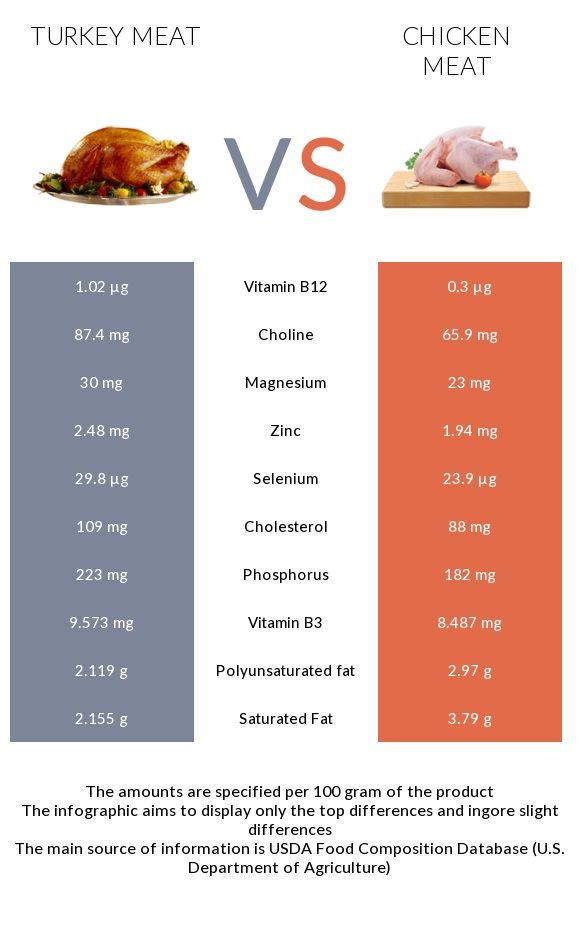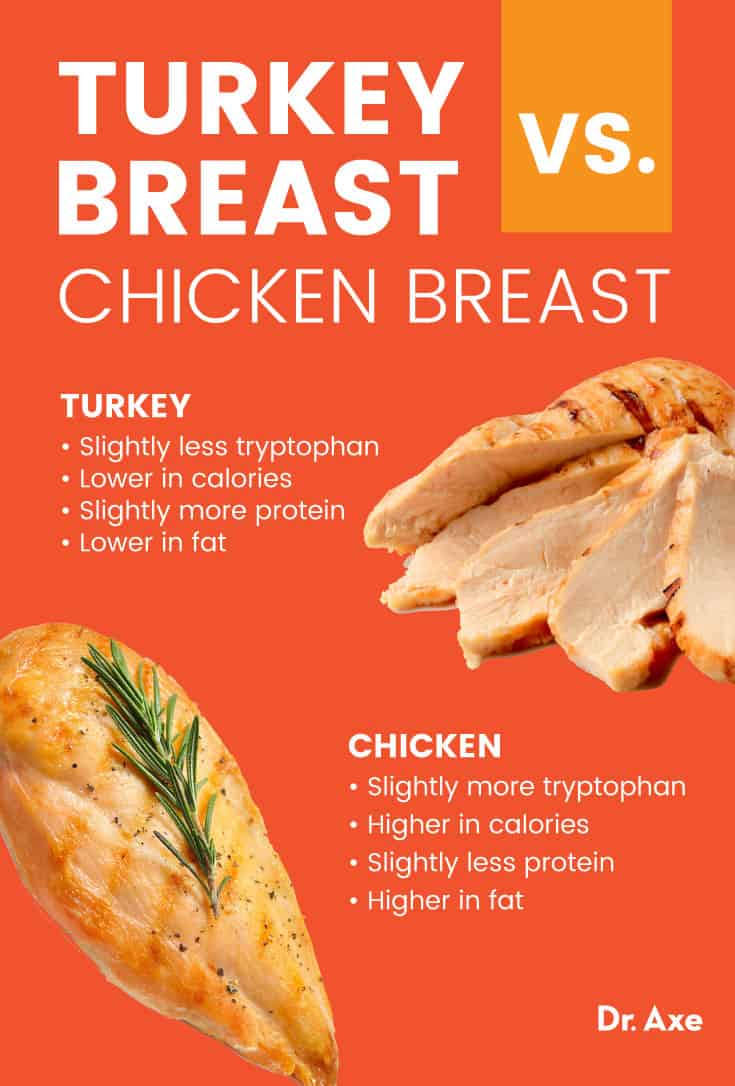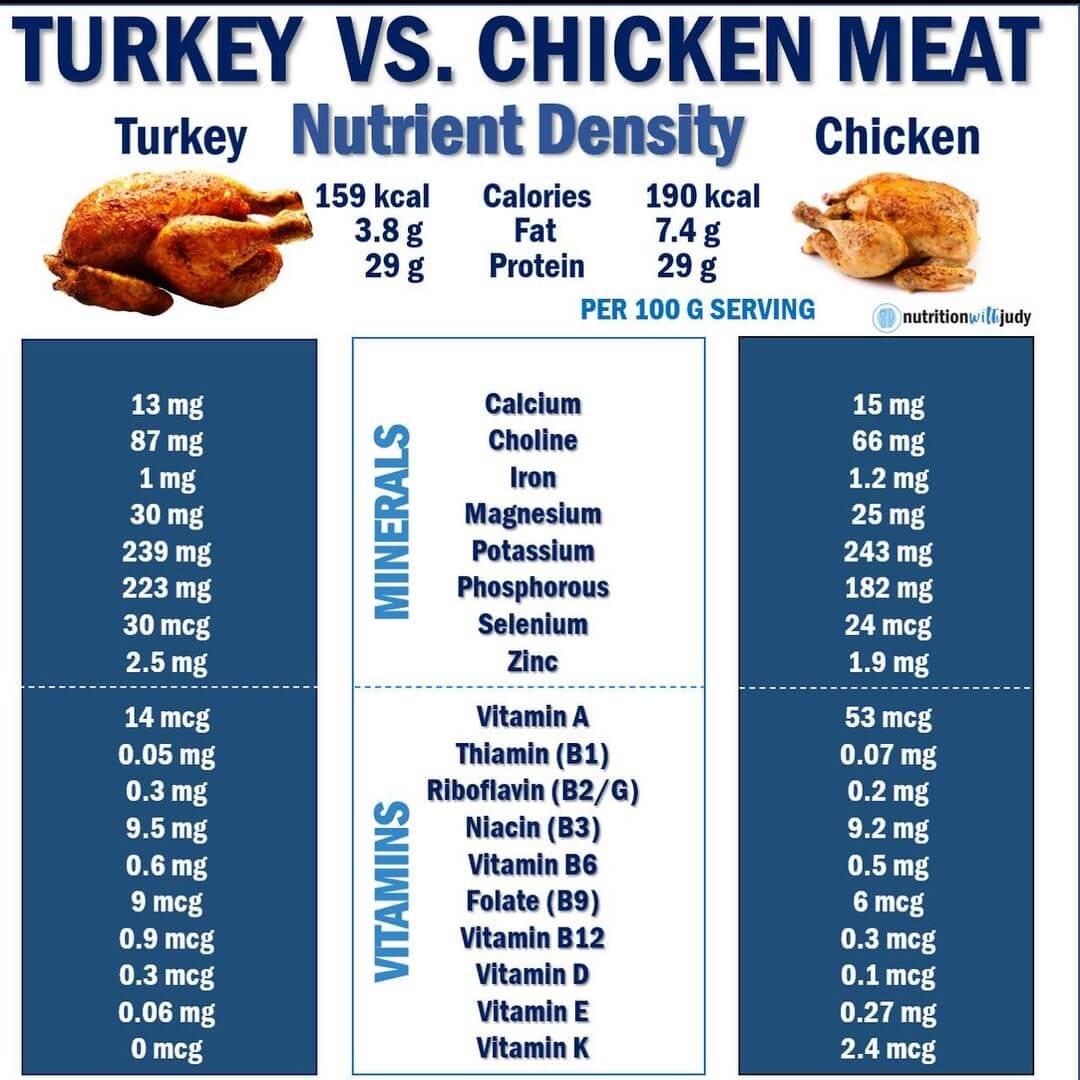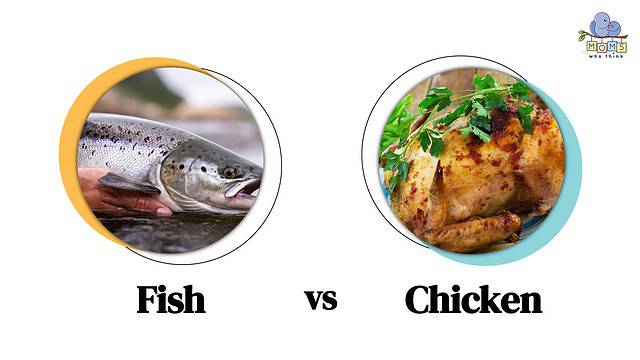Nutritional Comparison Of Chicken Breast And Turkey Breast

When it comes to comparing the nutritional profiles of chicken breast and turkey breast, the differences are minimal. Both are lean sources of protein, low in fat, and contain essential vitamins and minerals. In terms of calorie content, protein content, and percent daily value of iron, chicken breast and turkey breast are very similar. However, chicken breast tends to have slightly higher levels of sodium and cholesterol compared to turkey breast. Overall, both options provide a nutritious and protein-rich addition to any balanced diet.
Nutrient Content Of Chicken Breast
Chicken breast is not only delicious but also packed with essential nutrients. It is a great source of lean protein, with 1 ounce (28 grams) containing approximately 9 grams. In addition to protein, chicken breast is also rich in vitamins and minerals. Some of the key nutrients found in chicken breast include vitamin B6, vitamin B12, niacin, phosphorus, and selenium. These nutrients play important roles in energy production, immune function, and maintaining healthy cells. Incorporating chicken breast into your diet can provide significant nutritional benefits and support overall health and well-being.
Nutrient Content Of Turkey Breast
Turkey breast is a nutrient-rich protein option with a variety of essential vitamins and minerals. A 1-ounce (28-gram) serving of roasted turkey breast contains approximately 8 grams of protein, making it a comparable choice to chicken breast in terms of protein content. Turkey breast is also a good source of vitamins B6 and B12, niacin, phosphorus, and selenium. These nutrients play crucial roles in energy production, brain function, and immune support. With its low-fat content and abundance of nutrients, turkey breast is a nutritious addition to any balanced diet.
Health Benefits Of Chicken Breast Vs Turkey Breast

Chicken breast and turkey breast offer numerous health benefits. Both are excellent sources of lean protein, essential for muscle growth and repair. They also contain vitamins and minerals that support overall health. Chicken breast is particularly rich in vitamin B6, which plays a crucial role in brain function and the production of neurotransmitters. It also contains zinc, which boosts the immune system. On the other hand, turkey breast is high in selenium, a potent antioxidant that protects cells from damage, and niacin, which aids in energy production. Incorporating both chicken and turkey breast into a balanced diet can provide a wide range of nutrients for optimal health.
Protein Content In Chicken Breast
Chicken breast is renowned for its high protein content, making it a staple among fitness enthusiasts and health-conscious individuals. In just 1 ounce (28 grams) of roasted chicken breast, you can find approximately 9 grams of protein. This is an impressive amount, considering its low calorie content. Protein is essential for muscle growth, repair, and overall body function. It helps to keep you feeling satisfied and full, making chicken breast an excellent choice for those looking to maintain a healthy weight or build lean muscle mass. Incorporating chicken breast into your diet can provide the protein your body needs to thrive.
Protein Content In Turkey Breast
Turkey breast is a lean and nutritious source of protein, making it a popular choice among health-conscious individuals. In just 1 ounce (28 grams) of roasted turkey breast, you can find approximately 8 grams of protein. This is slightly lower than the protein content in chicken breast, but still provides a substantial amount of this essential nutrient. Protein is important for muscle growth, repair, and overall body function. Incorporating turkey breast into your diet can help meet your protein needs and support a balanced and healthy lifestyle.
Cooking Tips For Chicken Breast And Turkey Breast

When it comes to cooking chicken breast and turkey breast, there are a few tips that can help ensure a delicious and flavorful result. For chicken breast, it is best to cook it until it reaches an internal temperature of 165°F (74°C) to ensure it is fully cooked. To prevent dryness, brining or marinating the chicken before cooking can help lock in moisture. Additionally, using a meat thermometer will help you avoid overcooking and keep the chicken juicy. For turkey breast, it is recommended to roast it at a lower temperature, around 325°F (163°C), to maintain its tenderness and prevent it from drying out. Basting the turkey with butter or broth throughout the cooking process can also add moisture and enhance its flavor.
Best Cooking Methods For Chicken Breast
There are several cooking methods that can yield delicious and tender chicken breast. One popular method is baking, which involves placing the chicken breast in a preheated oven at around 400°F (200°C) for approximately 20-25 minutes. Another method is grilling, which adds a smoky flavor and can be done on a grill or stovetop grill pan. Pan-searing is also a great option, where the chicken breast is cooked in a hot skillet with some oil until golden brown on both sides. Lastly, poaching the chicken in simmering liquid can result in a moist and flavorful dish. Whichever method you choose, it is important to ensure the chicken reaches an internal temperature of 165°F (74°C) to ensure it is fully cooked.
Best Cooking Methods For Turkey Breast
When it comes to cooking turkey breast, there are a few methods that are particularly popular and effective. One option is roasting, which involves placing the turkey breast in a preheated oven at around 325°F (165°C) and cooking it for about 15-20 minutes per pound. Another method is grilling, which can give the turkey breast a smoky flavor. It’s important to cook the turkey breast until it reaches an internal temperature of 165°F (74°C) to ensure it is fully cooked and safe to eat. Lastly, some people enjoy brining the turkey breast before cooking it, as it can help keep the meat moist and add flavor.
Taste And Texture Comparison

When it comes to taste and texture, there are some notable differences between chicken breast and turkey breast. Chicken breast is known for its tender and moist texture, making it a popular choice for many. It has a milder flavor that lends itself well to a variety of seasonings and marinades, allowing for versatility in cooking. On the other hand, turkey breast tends to have a slightly firmer texture and a richer, slightly gamey flavor. It can be a bit drier compared to chicken breast, but proper cooking techniques can help keep it moist and flavorful. So, whether you prefer the tender and mild taste of chicken breast or the firmer texture and rich flavor of turkey breast, both options offer unique culinary experiences.
Flavor Profile Of Chicken Breast
Chicken breast is known for its mild and versatile flavor profile. It has a subtle taste that allows it to be easily incorporated into a wide range of dishes and cuisines. The flavor of chicken breast is often described as delicate and slightly sweet, making it a popular choice for those who prefer a milder taste. It also serves as a blank canvas for various seasonings and marinades, allowing cooks to experiment and create their own unique flavors. Whether grilled, roasted, or sautéed, chicken breast offers a delicious and satisfying flavor that can be enjoyed in a multitude of culinary creations.
Flavor Profile Of Turkey Breast
Turkey breast has a slightly stronger flavor compared to chicken breast. It has a rich and savory taste with a hint of sweetness. The meat is tender and juicy, offering a satisfying texture. The flavor of turkey breast is often described as earthy and slightly gamey. It pairs well with a variety of herbs and spices, making it a versatile protein option for different types of cuisine. Whether roasted, grilled, or sliced for sandwiches, turkey breast adds a delicious and unique flavor to any dish. Its aromatic qualities and robust taste make it a favorite for holiday feasts and special occasions.
Cost Analysis

When it comes to cost, chicken breast is generally more affordable compared to turkey breast. Boneless chicken breast is readily available year-round in most grocery stores and typically costs around $4.18 per pound. On the other hand, boneless turkey breast can be harder to find and is usually priced around $6.49 per pound. However, buying a whole turkey can be a more cost-effective option. It’s important to consider your budget and availability when choosing between the two.
Price Per Pound Of Chicken Breast
When it comes to cost, chicken breast is generally more affordable compared to turkey breast. On average, boneless chicken breast is readily available year-round in most grocery stores and typically costs around $3-$5 per pound. This makes it a budget-friendly option for those looking to incorporate lean protein into their diet. Whether you prefer to grill, bake, or sauté it, chicken breast offers a versatile and cost-effective protein option for a variety of meals. Remember to keep an eye out for sales and discounts to maximize your savings when purchasing chicken breast.
Price Per Pound Of Turkey Breast
On average, the price per pound of turkey breast can vary depending on factors such as organic or free-range options. Generally, turkey breast ranges from $3 to $10 or more per pound. Organic or specialty turkey breast may be priced higher due to factors such as certification and production practices. It’s important to consider your budget and preferences when choosing between chicken and turkey breast, as both can offer a healthy and delicious protein option. Remember to check for sales and discounts to get the best value for your money.
Conclusion

In conclusion, when it comes to the showdown between chicken breast and turkey breast, both options offer impressive nutritional profiles and health benefits. Chicken breast is known for its higher protein content and versatility in cooking methods, while turkey breast is a leaner option with a slightly milder flavor. The choice between the two ultimately depends on personal preferences and dietary needs. Incorporating both chicken and turkey breast into a balanced diet can provide a variety of nutrients and flavors. So, whether you prefer the classic taste of chicken or the leaner profile of turkey, both can be enjoyed as part of a healthy lifestyle.
Summary Of The Differences And Similarities Between Chicken Breast And Turkey Breast
When comparing chicken breast and turkey breast, it’s clear that they have many similarities. Both options are lean cuts of meat that are low in fat and high in protein. They also provide essential nutrients like vitamin B6, vitamin B12, and zinc. However, there are also some differences to consider. Chicken breast tends to be slightly higher in sodium and cholesterol compared to turkey breast. Additionally, while chicken breast has a milder flavor and is more versatile in cooking methods, turkey breast is known for its lean profile and slightly stronger taste. Ultimately, the choice between the two comes down to personal preference and dietary needs.
Recommendations For Incorporating Both Into A Balanced Diet
To incorporate both chicken breast and turkey breast into a balanced diet, it is important to vary your protein sources. Both options offer lean, high-quality protein, so alternating between them can provide a good balance of nutrients. Try incorporating chicken breast into your meals for its mild flavor and versatility in cooking methods, such as grilling, baking, or stir-frying. On the other hand, turkey breast can be used in dishes that require a slightly stronger taste, such as turkey burgers or roasted turkey breast. Including both options in your diet ensures a diverse range of flavors and nutritional benefits.
FAQ About Chicken Vs Turkey Breast: Poultry Protein Showdown
Q: What is the nutritional difference between chicken and turkey breast?
A: Turkey breast is slightly leaner than chicken breast with lower calories and fat content, but both are excellent sources of lean protein.
Q: Which is a better option for weight loss, chicken breast, or turkey breast?
A: Both chicken and turkey breast are great lean protein options for weight loss, but choosing between them depends on personal preference and nutritional needs.
Q: Are there any differences in taste between chicken and turkey breast?
A: Chicken breast is known for its mild flavor and versatility in cooking, while turkey breast can have a slightly richer taste, making it a popular choice for holiday meals.
Q: Can both chicken and turkey breast be used interchangeably in recipes?
A: Yes, chicken and turkey breast can often be used interchangeably in recipes that call for lean protein, though there may be subtle flavor and texture differences.
Q: Which is more cost-effective, chicken breast, or turkey breast?
A: Chicken breast is typically more widely available and may be more cost-effective than turkey breast, but prices can vary based on availability and region.
Q: Are there any specific health benefits to choosing chicken over turkey breast or vice versa?
A: Both chicken and turkey breast offer similar health benefits, including being low in saturated fat and high in protein, making them good choices for a healthy diet.

Duke City Kitchen, known for its fresh, simple, and delicious cuisine, has a rich history deeply rooted in the heart of the local food scene. Since its inception, Duke City Kitchen has been dedicated to providing an exceptional dining experience that celebrates the region’s flavors. Founded by a passionate group of food enthusiasts, Duke City Kitchen opened its doors with the vision of offering a welcoming space where people could gather to enjoy thoughtfully prepared meals made from the finest, locally sourced ingredients. This commitment to quality and community has been a driving force behind Duke City Kitchen’s success.